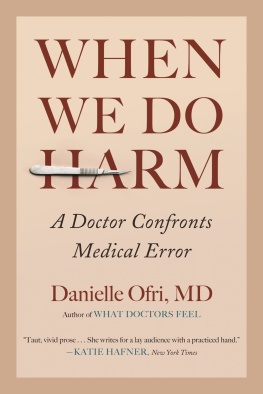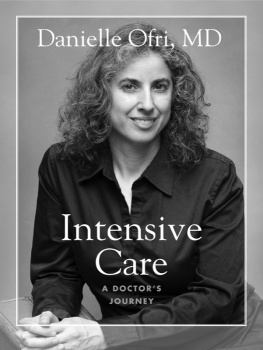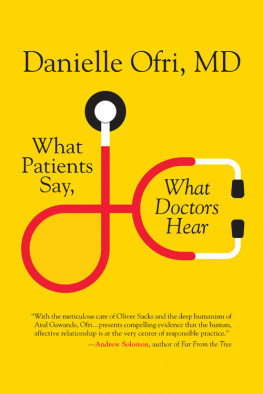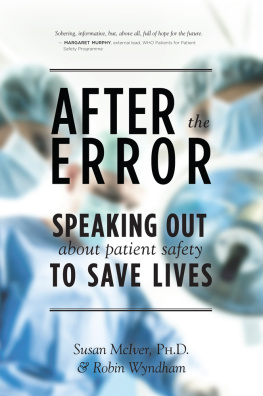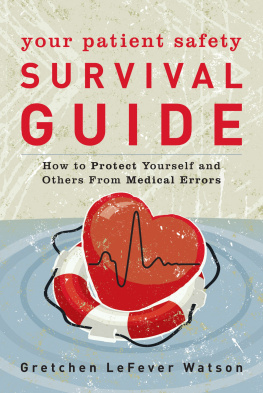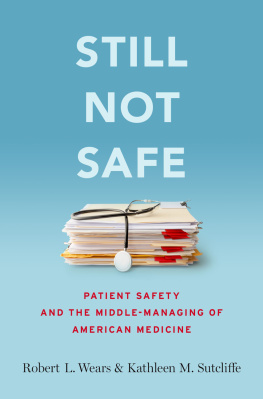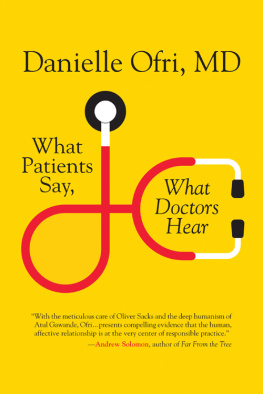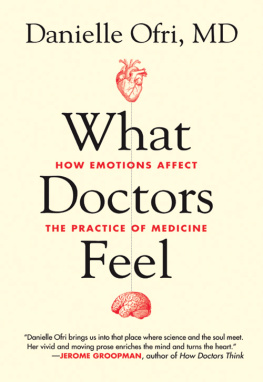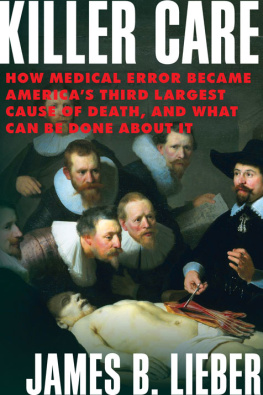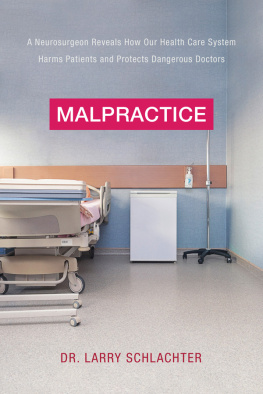CHAPTER ONE

JUMBO JETS CRASHING
I s this really true? my editor at Beacon Press emailed me skeptically. It was a spring afternoon in 2016 and she had tacked on an article from the British Medical Journal (BMJ) that caused headlines in the mainstream media (though it stirred up a healthy dose of criticism in academic circles). Medical error, the article concluded, was the third-leading cause of death in the United States.
I floundered for an answer to her question, and not just because I hadnt been keeping up with the medical journals that pile up relentlessly in my clinic, in my mailbox, in my inbox, and, okay, even in my bathroom.
I floundered because I genuinely could not answer her question. Third-leading cause of death? Really? Did medical error really beat out breast cancer, stroke, Alzheimers disease, accidents, diabetes, and pneumonia?
As a practicing internist for the past twenty-five years at Bellevue Hospital, one of the largest and busiest hospitals in the United States, I feel as though I see a reasonable cross-section of medicine today. My patients suffer overwhelmingly from the ailments of a twenty-first-century developed societyobesity, diabetes, heart disease, hypertension, cancer.
If medical error is the third-leading cause of death, then I should be seeing it all the time, right? I should be hearing about it from friends and family. If medical error clocks in just after heart disease and cancer as a killer, it should be part of my everyday medical experience.
But it isnt.
Or at least it doesnt feel that way.
I have witnessed medical errors, of course, and Ive certainly made my share of them. Ive heard bone-chilling tales in hospital corridors and read shocking, heart-wrenching stories in the media. Yet these all feel like exceptionsrare and horrible. These deaths dont pop up in my clinical practice with a frequency remotely near that of congestive heart failure, lung cancer, or emphysema.
Yet the data keep coming. From the first Institute of Medicine report in 1999 that estimated 44,000 to 98,000 deaths per year from medical error to this BMJ analysis suggesting upward of 250,000 deaths per yearmedical error seems on the verge of a public health emergency. Even if the numbers arent completely precisethe methodologies of these papers have been challengedresearchers are in agreement that the number of errors is not small at all.
Are the data wrong? Or am I wrong?
Am Iand most medical staffsimply not seeing this epidemic? Are we biased? In denial? Are we clinicians killing our patients at an unprecedented rate and somehow remaining blithely unaware? If thats really the case, perhaps we should take down our collective shingles and spare our patients the damage. We could just tack a note onto the door: Eat quinoa and beans. Take the stairs. Stay away from the healthcare system.
While the third leading cause of death claim is likely an overstatement, there is definitely a yawning gap between the published statistics of medical error and the experience of the everyday clinician. And then there are the experiences of the everyday patient, which also diverge from the data but in different ways.
As a practicing physicianand an occasional patient myselfI feel I have to get to the bottom of this. What I experience and what the published data conjecture seem at complete odds. One of us is calling it wrong, and my goal is to find out who.

If the history of medicine over the past two hundred years were a feature film, it would be a swashbuckling adventure epic. Heroes in white coats would brandish stethoscopes and pipettes, decapitating disease in single fell swoops with their medical machetes. Sanitation, antisepsis, and anesthesia would hurl across the screen, flattening 19th-century illnesses. Vaccines and antibiotics would explode like grenades in the early 20th centuryrescuing the masses from infectious marauders. Our triumphant superheroes would swagger into the second half of the twentieth century, whirling about to execute 360 degrees of jujitsu strikeschemotherapy, dialysis, antipsychotics, blood transfusions, birth control, CT scanners, cardiac catheterization, ICUs, statins, antihypertensives, HIV treatmentslaying every dragon in the room with hardly a backward glance. The movie would be one straight trajectory of progressive victory over disease, nearly doubling average life expectancy before you even approached the unpopped kernels at the bottom of your greasy popcorn box.
Staggering success has been the dominant leitmotif in medicine. With good reason! Turning once-uniform killers into afterthoughts is an impressive feat that should not be taken for granted. But this theme of relentless victory hasnt left much space in the narrative for talking about the medical errors and adverse outcomes of our treatments. At best, these were annoying pebbles along the road upon which our heroes confidently strode.
Its not that medicine does not examine errors. Morbidity and mortality conferencesaffectionately known as M&Mshave been a part of medicine for a century. M&Ms were, and still are, formal evaluations of bad outcomes. But the rugged individualism of our medical heroes filtered through to our analysis of medical mistakes, with the general approach being to figure out whator more often whohad malfunctioned and then fix that thing. Still, these errors were seen as mere footnotes to the inexorable sense of progress. All would get fixed by the indefatigable advances of medical research.
Its not surprising, therefore, that the tallying of medical harms was never a flourishing area of medical research. The gray-haired establishment of medicine was of the view that the noble art of medicinebolstered by the juggernaut of scientific researchwas exemplary in its ministrations. Instead it was the trainees, in fact, who were among the earliest to point out the blind spots.
Robert Moser, a resident at Brooke Army Medical Center, was one of the first people to take a hard look at the downsides of medical care. In a 1956 paper in the New England Journal of Medicine, he described diseases that would not have occurred if [the] therapeutic procedure had not been employed. This paper may have been the first to survey the damages that we clinicians do, even in the name of good medical care. He titled his paper Diseases of Medical Progress and found that about 5% of patients experienced these.

